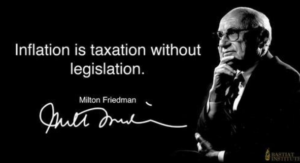
Why Generation Y And The Young Continue To Have It Worse Than Their Parents
The definition of Generation Y from the Urban Dictionary is “the offspring of Generation X and the baby boomers, born typically between the mid 1970s and mid 1990s”. This generation is also often referred to as Millennials and is widely predicted to become, or already is, the first generation in history (at least in the West) to do worse than their parents (and even grandparents) financially.
This post seeks to explore the various political forces, economic headwinds and other factors, some closely inter-related, that are working against the ability of Millennials (and subsequent generations after them) to lead financially successful lives.
Universtity Debt & Education
In terms of being able to collect bits of paper from universities with degrees, masters and doctorates printed on them, the current generation is the most educated in history. On the surface, this may seem like a good thing, but previous generations who did go to university didn’t pay any tuition fees, rarely had to take out any loans and even received grants to study, while now students commonly graduate with a debt built up of at least £50,000. With interest also accruing this dramatically slows the ability of the young to become solvent and to start building their own capital and assets.

The formal education being bought in many cases is a worthless dud and increasingly has little practical relevance to the vast majority of ways to earn an income in the modern world. In the UK all universities are state owned non-innovative bureaucratic monoliths and their employees are cushioned and divorced from the real world. Coupled with the new fuel of ever larger loans taken out by students for tuition fees, universities have no incentive to adequately prepare the young for the jobs market, let alone entrepreneurship. All the time innocent students are being goaded and misguided by parents, teachers and government as they tout that a traditional university education is critical to a young person’s future success.
Once a student graduates from university they encounter high unemployment, underemployment, or end up earning a living in an industry where gaining a few months work experience would have been far more valuable than spending a comparative fortune on a degree. Everyone knows graduates who have moved back home to live with their families after studying because, even if they have been lucky enough to find work, they increasingly can’t pay off their university loans while also paying for a place to live and other living expenses. These young people are not saving to buy a home or to start a family or a business; at the beginning of their adult lives, they are struggling just to get by.
Job Market & Income
Baby boomers seemed to be able to walk into a well paid respectable job where they could stay for life if they wanted and progress within the organisation. It is now much harder to get such a position and they are becoming increasingly rarer. Those now entering the workforce will experience no or very little job security and moving from one employer to the other has become the norm.
Generation Y are still receiving the same industrial era type of education that provided their parents with a gateway to a comfortable middle class life, but once they enter the real world find that the positions they trained for in various professions either don’t exist or are so rare as to be all but impossible to secure. Entry level positions in the private sector that offered career prospects and professional development have begun to disappear as businesses have scaled back their hiring of new employees as they attempt to compete in an increasingly globalised economy and take advantage of technology to outsource as much of their business as possible.
Those still at school are kept cosseted from this new reality and the education they receive is ill fitting for an economy in such flux where people increasingly need to think for themselves, embrace new technologies, be flexible, network and look to create their own opportunities rather than just ‘get a job’.
This combination of the lack of traditional jobs that the young have been told they are entitled to and the fact that most have not developed an entrepreneurial skills-set to survive and thrive in the modern world means that Generation Y’s earning abilities have been curtailed and they do not enjoy the same level of income as their parents at the same age did.
Property & Asset Price Inflation
I’ve written before on the craziness of property prices in London and the UK. At the same time as generation Y has struggled to develop a career and increase their earnings, the house price to income ratio has continued to rise ever higher. In fact, such a phenomenon has been mirrored across other asset classes, not just property, so that the asset poor young have been getting progressively impoverished while older generations who already own property and assets have increased their net wealth.
Without the assistance of parents, buying a home has become a distant dream for most as those that exchange labour for money have been simply priced out of the market and are thus forced to continue paying high rents for longer, all the time compounding the problem and making it less likely they will accumulate sufficient savings to get on the housing ladder.
Low interest rates have remained in place for years and have had a ruinous impact on those trying to save for a deposit while creating inflation as the wealthy have continued to be able to access cheap credit, acquire assets and pursue rent seeking activities. A complete lack of new housing development has also protected the otherwise insolvent banks by helping to drive up the value of their mortgage books at the expense of younger generations.
All the time, the UK has been encouraging overseas investment in UK residential property, particularly in London and the South East. London has become a global centre for both money laundering and safeguarding wealth as people from every corner of the world are attracted to the seemingly inexorable rise of London property prices and the UK’s open property market.
In the majority of cases (in London anyway) the properties that are bought are left empty for most of the year and are never rented out, they are held in the same way as gold bars, just as a secure store of value. As a lawyer I know that in pretty much all cases overseas owners will buy through an offshore registered company and will not be subject to stamp duty, or capital gains tax when they re-sell the property. Britain’s taxation of foreign property owners is generous by international standards and gives international buyers major advantages over UK nationals who simply want to buy somewhere so they can both live and work in the country, as well as have the security of owning their own home and the chance to own an appreciating asset.
Those lucky enough to eventually get on the property ladder not only have to pay a small fortune and incur a massive mortgage to live in a pathetically small one or two bedroom flat, but if and when they’d like to upgrade to somewhere a bit bigger, or more family friendly, they will not only have to pay even more grossly inflated prices for ‘family sized’ homes, but will also have to pay many more thousands of pounds in stamp duty to the thieving government when their parents only ever had to pay a flat rate of 1% stamp duty on their property transactions.
How the ratio of house prices to annual earnings in the UK increased between 1997 and 2012 pic.twitter.com/MweOMWRxgT
— Jonathan Lea (@jonathanlea) June 19, 2014
House prices, house building and economic growth in England pic.twitter.com/p25FnQEEBF
— Jonathan Lea (@jonathanlea) August 22, 2014
Low Interest Rates
Ok, so I’ve already touched on low interest rates above. Higher home prices have been driven by the Bank of England’s ‘quantitative easing’ money printing and zero interest rate policy that helps debtors and the wealthy, but not Millennials earning an income in the real economy. Cheap credit has done nothing but de-value money for those that actually produce products and services. It corrupts the market as capital is accumulated by speculators and rent seekers at the expense of responsible and hard working productive people whose incomes are debased and savings destroyed.
It is perhaps no surprise that Britain has a declining savings culture when there are so many pressures on people’s incomes and to the extent they can leave some of it in a bank account there seems little or no point in saving when interest rates are so low.
Despite the government’s best efforts to distort and falsify official inflation figures (they even omit house prices from their official calculations) inflation is a type of destructive hidden tax that falls on each citizen in the form of higher prices as the buying power of money earned decreases, while government and banks who can run the UK’s fraudulent system of creating money can’t get enough of it as they benefit from the legalised counterfeiting by creating value out of nothing at the expense of everyone else. This ability to create money and inflation used to be significantly curtailed for earlier generations when the UK stuck to the gold standard and sound monetary policies. Alas, barring some kind of revolution it doesn’t seem that those days will be returning anytime soon.

The banking system and their mouthpieces in government like to consistently spin the line that deflation (falling prices) hurts productivity, but this is absurd. You need only look at the computer industry, which has become vastly more productive and profitable even as the prices of its products have fallen precipitously, while from my own personal experience those that have benefited from using Bitcoin from the early days invest much more in their own business and others, an opportunity that would not be afforded to them if they had just been earning and using fiat currencies.
As John Maynard Keynes observed in The Economic Consequences of the Peace (1920):
“Lenin (the founder of the former communist Soviet Union) was certainly right. There is no subtler, no surer means of overturning the existing basis of society than to debauch the currency. The process engages all the hidden forces of economic law on the side of destruction, and does it in a manner which not one man in a million is able to diagnose”.
Expansion of Government & Taxation
Government has continued to grow and those looking to earn a living in the UK’s market economy are faced with an ever-increasing blizzard of regulations and an expanding huge, complex tax code.
At the same time, large multinationals are ever more protected through regulatory capture and their tax minimisation strategies being sanctified by bought and paid for politicians. This allows politically connected corporates to significantly enhance their position at the expense of growth in the wider economy.
The lives of UK citizens have long been circumscribed by diktats from Brussels, but over the years this bureaucracy has grown increasingly powerful and unaccountable. Open Europe estimates that the top 100 EU laws now cost the UK economy £27.4 billion a year which is more than what the UK Treasury expects to raise in revenue from Council Tax each year.
ICAEW’s Enterprise research has indicated that the UK regulatory environment poses a challenge to UK business. When asked how things have got worse, examples cited are often related to specific legislation for the industry sector in which a business operates in, but the overall picture is one of an increased volume of regulation which is challenging to keep up with, thus increasing the administrative burden and cost of running a business. This is certainly true in the legal industry in which I operate as there has been a significant decline in the number of small firms and sole practitioners and a resulting lack of innovation and competitiveness in the market, while legal services have simply become unaffordable for the majority of small businesses.
Regulations largely do nothing but cut off avenues of entrepreneurship, rewarding established businesses at the expense of upstarts and the ability of many people to compete and earn a living in an open market. Even if no money is collected and no monetary depreciation occurs, regulations are no less a confiscation of property and therefore prosperity.
At certain times in the past the UK experienced governments with a pernicious love of taxation, not least the Labour government of the 1970s when the top rate of income tax rose to 83% and reached 98% when an investment income surcharge was applied. However, government has consistently found new taxation avenues and even now with a supposedly pro market and business orientated Conservative coalition government, taxes are estimated to have been increased almost 300 times by the time their time in office ends in 2015.
Increased Financialisation
Financialisation refers to the increasing importance of financial markets, financial motives, financial institutions, and financial elites in the operation of the economy and its governing institutions, both at the national and international levels. Financialisation is also the mass commodification of debt and debt-based financial instruments, creating a pyramiding of risk and speculative gains to be made that is only possible when there is a massive expansion of low-cost credit and leverage.
Financialisation results when leverage and information asymmetry replace innovation and productive investment as the source of wealth creation. Thus this fraudulent, ponzi form of finance creates perverse incentives, hollowing out the economy as there is an advancing decline in manufacturing and activities that seek to benefit society.
This capital misallocation leads to inflated asset prices, lower productivity, mal-investments, less innovation, less entrepreneurship, and, therefore, depressed job creation and low overall economic growth. The overall result is a widening economic disparity and destruction of the middle class as wealth is transferred from regular working families to non-productive financial institutions, specifically to the people who work at the upper levels of those institutions who have access to cheap money and jack up the value of assets such as houses, rendering them increasingly unaffordable to everyone else, especially younger people.
Andy Xie, in China’s Caixin Online financial news site, describes how financialisation harms the overall economy of a country:
“Globalization has made compensation global. However, the cost of living, is still locally driven. Anglo-Saxon countries while they lose out in manufacturing, their policies have encouraged financialization of their economies for temporary gains in economic prosperity. Financialization leads to inflation while their workers lose out in global competition and face escalating living costs.”
Inflated asset values also serve another agenda in that they increase the amount of debt being issued, therefore enabling banks to increase their profits. Loans are made because the lender makes money out of thin air from creating the debt (the fractional reserve banking system doesn’t require such loans to actually be backed by reserves) and from fees associated with arranging the loan, whether or not the borrower eventually defaults. People owning homes free and clear of debt is not profitable for banks.
Retirement & Pensions
So given the huge financial pressures on young people today, it is inevitable that they also face a pensions crunch. While their parents enjoyed generous final salary pension plans, these have now pretty much died and those entering the workforce today have no expectation that they will one day have even a reasonable pension to live off. Their position is further exacerbated by the fact that they will increasingly be clobbered by the government as it faces a crisis to meet its pension obligations for a growing elderly population who retired on final salary plans and are living far longer than expected when their schemes were constituted.
Companies have now replaced these expensive schemes with “defined contribution” alternatives where instead of lifetime payout worth two-thirds of your final pay cheque, the pension you get is determined by how much you put in, investment returns, and the state of interest rates when you reach retirement.
At the same time, given the recent history of government tax raids on pensions (by Gordon Brown in particular) and the failure of life assurance companies like Equitable Life (while no protective legislation ensued), the young are not confident of giving up a chunk of their pay each month when the benefit they should receive decades in the future has the ability to be severely compromised.
Even so, with younger generations needing to save at a mind-boggling rate to accumulate enough to retire, the retirement prospects for younger workers have dimmed markedly and many increasingly expect that they will have to work until they drop.
Decline of Family & Birth Rate
Unsurprisingly, highly indebted Western economies are witnessing declining birth rates. When the young realise what they are up against and endure years of trying to build a career without being able to build much capital, they experience more intense conflicts between family and career ambitions than their predecessors ever did.
The time requirements of work have shot up astronomically, student debt and property costs have exploded and all the time competition in the labor market has escalated as most industries increasingly compete globally.
Its not that being a parent and starting a family is not any less important for most young people, but many, even when they are on joint incomes (no longer is it possible for one parent to to earn enough to afford for the other to stay at home), just don’t see how they can manage and afford it. The financial demands on younger generations are a modern day version of enslavement and the resulting all-encompassing nature of work essentially becomes a form of birth control for people who might otherwise be able to start and manage a family.
Conclusion
The common denominator in this post is the growing amount of debt and the hoovering up of wealth by the parasitical and thieving financial system, its banking institutions and their direct dependants. The declining fortunes of younger generations have coincided with the growth of a fraudulent economic system that generates mass debt slavery through pernicious usury and allows a ruling cabal to steal the hard earned income of the masses and asset strip the wealth of everyday citizens.

In recent history, the UK’s central bank has essentially made limitless funds available to banks and financiers at near-zero interest rates. This privilege creates an ever wealthier class of financial predators and parasites whose skimming operations stripmine productive assets and labour. The only possible result of this usurious and fraudulent fractional reserve banking system is widening wealth inequality, the destruction of the middle class and the creation of a feudal, degenerate society.
Given the explosion in new disruptive technologies and the opportunities they present for entrepreneurship and wealth creation, current and future generations would no doubt be able to unleash an unprecedented era of positive economic growth if they were not faced with the challenges outlined above.
